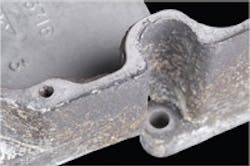Innovative Aluminum Diecasting Alloy Resists Corrosion
Exposing aluminum or aluminum alloys to extremely harsh environments has always held an inherent risk of corrosion—which ultimately may result in product or system failure. With its innovative K-Alloy technology, Delphi Corp. (www.delphi.com) is helping licensed manufacturers to produce aluminum components that last longer in everything from vehicles to outdoor lighting components.
Delphi supplies mobile electronics and transportation systems for automotive manufacturers, including powertrain, safety, steering, thermal, and controls/security systems, electrical/ electronic architecture, and in-car entertainment technologies. Originally, it developed and patented K-Alloy to produce more robust aluminum diecast components for under-hood applications where salt corrosion, heat, vibration, and shock could lead to part failure—and higher warranty costs for the manufacturer. In production since 2003, Delphi has millions of K-Alloy parts in the field demonstrating timeproven performance, as evidenced by fewer warranty claims.
This aluminum casting alloy is described as having “designed-in corrosion resistance.” Manufacturers licensed to use K-Alloy are introducing products that show corrosion resistance superior to parts made with traditional aluminum alloys like A380, A360, and A413.
Significantly, manufacturers using K-Alloy are often able to avoid adding expensive coatings to the components they produce. “We have seen K-Alloy subjected to 3,000 hours of ASTM B117 salt-spray testing with no metal loss or surface damage,” states Kurt O’Connor, Delphi technical fellow, advanced materials and processes. “Other aluminum alloys would require anodizing or chromating, followed by powder coat or paint, and they still would not measure up to K-Alloy’s corrosion resistance.”
In addition to diecasting, K-Alloy can also be used in semi-permanent mold casting, and can provide significant benefits to a wide range of applications beyond automotive.
There are other material and performance benefits, too. For example, KAlloy dissipates heat rapidly. Thermal conductivity testing conducted by Thermophysical Properties Research Laboratory Inc. (www.tprl.com) showed that K-Alloy outperforms other commercially available and commonly used alloys, such as A380. In fact, K-Alloy reportedly offers thermal conductivity that is 15% better than A380, a factor can be boosted to as much as 40% for high-performance applications.
“Most of K-Alloy’s mechanical properties are remarkably similar to those of other standard diecasting alloys,” says David G. Isaacs, CEO of MDW Technologies L.L.C., “In many cases, manufacturers may not have to undergo potentially expensive major processing changes to take advantage of K-Alloy. It may be substituted into existing customer tooling often without modifications. Some of our customers have even said that K-Alloy is easier to cast.”
Delphi has appointed MDW Technologies (www.mdwtech.com/kalloy) as its technical and licensing representative to broaden its customer base. In August Delphi announced a strategic licensing agreement with Beck Aluminum to produce and market K-Alloy. The agreement is designed to simplify the process to gain access to the patented material and improve its competitiveness through increased availability, at attractive prices.
According to Timothy Forbes, Delphi director of commercialization and licensing, “Our new strategic licensing agreement will allow us to significantly increase the adoption of this outstanding alloy by increasing the availability to aluminum die casters.”
Cleveland-based Beck Aluminum supplies aluminum alloys for more than 700 customer locations in the U.S., Canada, and Mexico. Beck Aluminum Intl. was formed recently to handle the company’s growing import/export shipments. Every month Beck Aluminum sells more than 30 million lb of aluminum products and recycles approximately 15 million lb of scrap. “We’re pleased that we’re already producing over 100,000 lb of K-Alloy per month at our smelter in Lebanon, PA,” the producer states. “We have already had inquiries for new programs and applications that will each require several million pounds of K-Alloy per year.”
